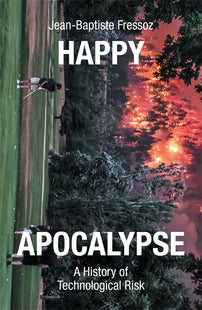Verso Book Club: Happy Apocalypse
Happy Apocalypse: A History of Technological Risk by Jean-Baptiste Fressoz is one of our Verso Book Club July reads.

Jean-Baptiste Fressoz is a young environmental historian who likes upsetting just-so narratives and easy, sweeping generalisations about great epistemological and ontological shifts, or “great divisions”, in modernity. Instead, he prefers to burrow away in the details of debates of different periods (particularly from the eighteenth century to the present) to demonstrate surprising continuities that belie our narcissistic self-images, whether encapsulated in notions such as “reflexive modernity” (Ulrich Beck) or more popular forms (such as the notion that we have all gained a new awareness of the ecological thanks to Al Gore or – God help us - the film Don’t Look Up).
This bold revisionist bent (in the positive sense of the word) was first demonstrated to Verso readers in the book co-authored with Christophe Bonneuil, The Shock of the Anthropocene, an indispensable account of the debates around anthropogenic climate change that strongly argues for the highly problematic nature of the concept of the Anthropocene, especially inasmuch as it pushed capital and war out of the picture.
In the recently published, Chaos in the Heavens, co-authored with Fabien Locher, Fressoz offered us a fascinating insight into the longue durée history of debates over climate change and the contribution of human behaviour in it, tracing this all the way back to the Spanish Empire and following it through the debates on deforestation in and after the French Revolution (raising the all important question of property rights…), British and other imperialisms of the nineteenth century and all the way to the Second World War.
In his forthcoming book on the myth of the “energy transition” (sadly and unjustly not to be published by Verso but by a bourgeois publisher!), Fressoz advances a very powerful critique of this notion that is not only empirically false (forms of energy are additive not substituted one for the other) but has its origins in the very lobbies and industries that want to prolong fossil capital for as long as possible.
In his newly published Happy Apocalypse: A History of Technological Risk, Fressoz argues persuasively that, far from there being an all-dominating naïve notion of technological “progress” that has persisted from the Industrial Revolution until we “awakened” very recently, all major technological shifts were always highly contested and debated and only succeeded thanks to powerful “coups de force” (“imposed situations and normalised exceptions”), followed by what he calls “disinhibition” that remoulds retroactively the normative frameworks, thereby rendering such innovations seemingly logical, normal or desirable. As he puts it at the beginning of this book:
And, a bit further on:
Tracking this through a number of fascinating case studies – inoculation and vaccination against smallpox, the chemical industry and gas lighting, steam and rail technology, Fressoz demonstrates that these are not just of historical interest but, rather, of burning relevance today. Unless we break radically from such depoliticised and idealistic views of the past, we will not be able to tackle the real factors behind the ecological crises of today. Or, as he put it in an interview that will soon by on the Verso blog:
So, this is a book not only for every student of history’s nightstand but also for ever activist’s backpack!
Sebastian Budgen, Editorial Director, Verso Books
Paris, October 2023
Happy Apocalypse: A History of Technological Risk by Jean-Baptiste Fressoz is one of our Verso Book Club July reads.
[book-strip index="1" style="buy"]

